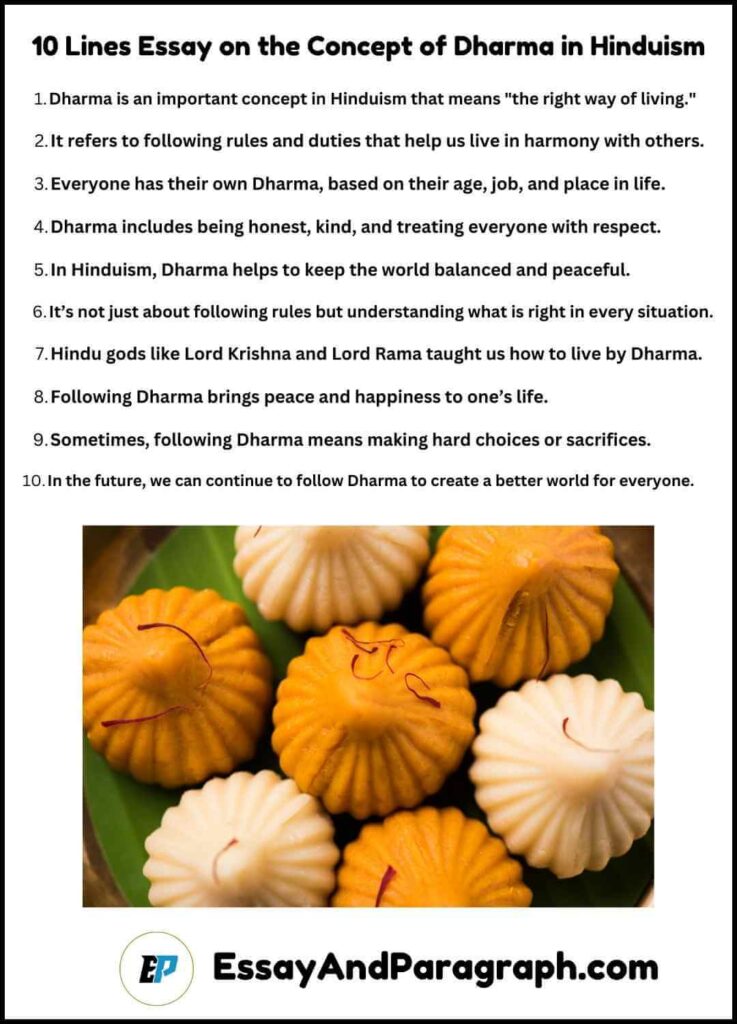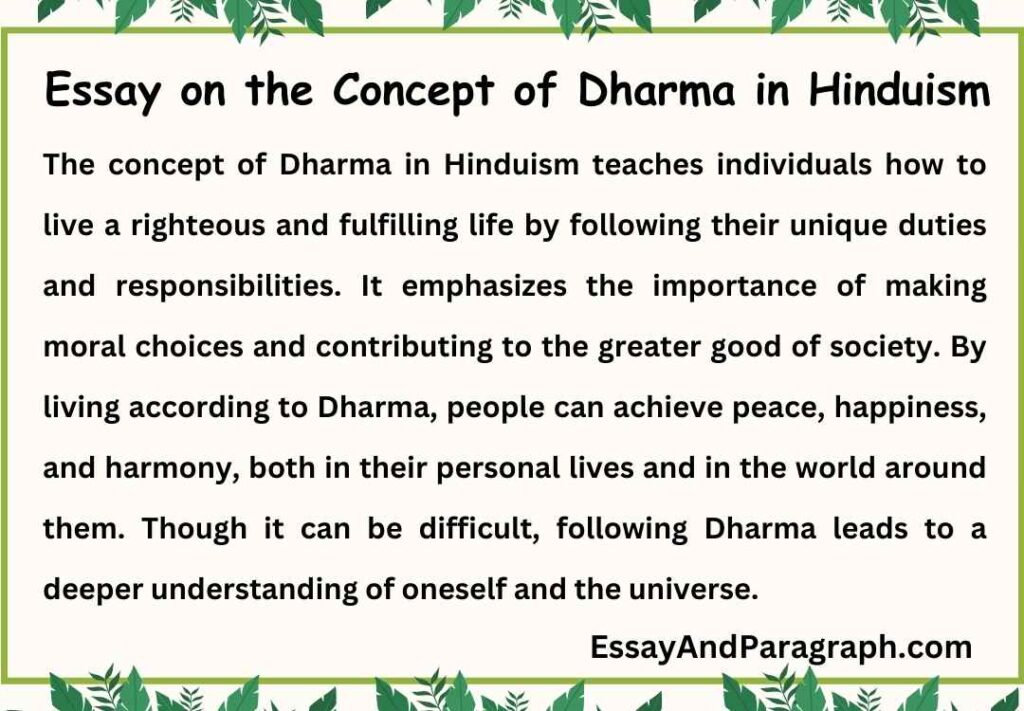Have you ever wondered why people follow certain rules or principles in life? In Hinduism, there’s a concept called Dharma that helps guide people on how to live rightly. Dharma means “the right way of living” and is a central idea in Hindu beliefs. It includes doing what is morally right, fulfilling one’s duties, and maintaining harmony with others. In this article, we will explore what Dharma means and how it influences the lives of Hindus in the world today.
10 Lines Essay on the Concept of Dharma in Hinduism
- Dharma is an important concept in Hinduism that means “the right way of living.”
- It refers to following rules and duties that help us live in harmony with others.
- Everyone has their own Dharma, based on their age, job, and place in life.
- Dharma includes being honest, kind, and treating everyone with respect.
- In Hinduism, Dharma helps to keep the world balanced and peaceful.
- It’s not just about following rules but understanding what is right in every situation.
- Hindu gods like Lord Krishna and Lord Rama taught us how to live by Dharma.
- Following Dharma brings peace and happiness to one’s life.
- Sometimes, following Dharma means making hard choices or sacrifices.
- In the future, we can continue to follow Dharma to create a better world for everyone.

Short Essay on the Concept of Dharma in Hinduism
In Hinduism, Dharma is a central and guiding principle that shapes the way people live. It can be understood as “righteousness” or “duty” and refers to the moral laws and guidelines that individuals must follow to lead a good life. Dharma is not the same for everyone. It varies depending on a person’s role in society, age, gender, and other factors. For example, a teacher’s Dharma is to educate others, while a parent’s Dharma is to take care of their children and teach them the values of life.
The concept of Dharma is deeply rooted in Hindu scriptures like the Bhagavad Gita, where Lord Krishna advises Arjuna on the importance of following one’s Dharma in the face of challenges. It teaches that every person has a unique role to play, and by fulfilling that role, they contribute to the balance of the world.
One of the key aspects of Dharma is the importance of making choices that are morally right. For example, if someone witnesses an injustice, it becomes their Dharma to take a stand and help others, even if it is difficult. This is often seen in stories of Hindu gods, like Lord Rama, who always acted according to Dharma, even when it meant facing difficult challenges.
Following Dharma also brings a sense of peace and happiness, as it helps individuals feel that they are doing the right thing. It ensures that society runs smoothly and that everyone’s rights and needs are respected. However, it is not always easy to follow Dharma, and sometimes it requires sacrifice or making tough decisions. Despite these challenges, living according to Dharma ultimately leads to a harmonious and fulfilling life.
Long Essay on the Concept of Dharma in Hinduism
In Hinduism, Dharma is one of the most important concepts, guiding how individuals live, work, and interact with others. It is often translated as “righteousness” or “duty,” but its true meaning is much deeper and more complex. The concept of Dharma reflects the belief that there are universal laws that guide human life, helping individuals lead lives filled with moral integrity, wisdom, and compassion. Dharma is closely tied to the idea of justice, fairness, and the balance of the universe.
The idea of Dharma is explained in various Hindu texts, including the Vedas, Upanishads, and the Bhagavad Gita. In the Bhagavad Gita, Lord Krishna explains to Arjuna that every individual has a unique Dharma depending on their age, job, and responsibilities. For example, a teacher’s Dharma is to impart knowledge, while a parent’s Dharma is to raise children with values. This idea suggests that everyone has a role to play in maintaining the harmony and balance of society.
One key feature of Dharma is that it teaches people to make moral choices based on what is right, even if those choices are difficult. In the Bhagavad Gita, Arjuna faces a moral dilemma on the battlefield of Kurukshetra. He is hesitant to fight in the war, as it involves killing his relatives and friends. Lord Krishna tells him that it is his Dharma as a warrior to fight in the battle, as it is his duty to protect justice. This story emphasizes that Dharma is not always easy to follow, and sometimes it requires individuals to make tough decisions.
Another important aspect of Dharma is its emphasis on the interconnectedness of all beings. By following one’s Dharma, individuals contribute to the overall well-being of society and the world. For example, by performing one’s duties with dedication and integrity, a person helps maintain the balance of nature and society. Dharma encourages people to live harmoniously with others, showing respect, kindness, and fairness in their actions.
While Dharma is universal, it is not the same for everyone. It varies based on factors like one’s stage in life, occupation, and social role. In Hinduism, these differences are often reflected in the concept of the Varna system, where individuals are classified into four main groups: Brahmins (priests and scholars), Kshatriyas (warriors and rulers), Vaishyas (merchants and farmers), and Shudras (workers). Each group has a specific Dharma that aligns with their role in society. This allows people to work together to maintain order and balance.
One of the challenges of living according to Dharma is understanding it in the context of everyday life. Sometimes, people may be unsure about what is the right course of action in a given situation. Hindu teachings suggest that by staying true to one’s inner conscience and seeking wisdom, individuals can discern their Dharma. This may involve consulting sacred texts, seeking advice from wise elders, or meditating on the best way to act.
In conclusion, Dharma in Hinduism is more than just a set of rules or duties; it is a way of life that encourages individuals to live in harmony with themselves, with others, and with the world. By understanding and following Dharma, individuals contribute to creating a just, peaceful, and balanced society. It is not always easy, but by living according to Dharma, people can achieve a sense of fulfillment and peace, knowing they are doing what is right.
FAQs on the Concept of Dharma in Hinduism
1. What does Dharma mean in Hinduism?
Dharma in Hinduism refers to the right way of living. It includes moral duties, responsibilities, and actions that align with universal laws. It guides individuals on how to behave with others, make ethical decisions, and live a life of righteousness. Dharma is different for everyone based on their role in society, age, and gender.
2. How does Dharma differ from person to person?
In Hinduism, Dharma is not a one-size-fits-all concept. It varies based on a person’s age, role in society, and occupation. For example, the Dharma of a teacher is to educate, while the Dharma of a parent is to care for and teach their children. This ensures that everyone plays their part in creating a balanced and harmonious society.
3. Why is Dharma so important in Hinduism?
Dharma is crucial in Hinduism because it provides a moral and ethical framework for living. It helps individuals understand their duties and responsibilities, promotes harmony, and ensures justice in society. By following Dharma, people contribute to the overall well-being of the world and lead lives of peace and fulfillment.
4. What is the connection between Dharma and the Bhagavad Gita?
The Bhagavad Gita is a key Hindu text that explains the importance of Dharma. In the Gita, Lord Krishna teaches Arjuna that his Dharma as a warrior is to fight in the battle for justice. The Gita emphasizes that following one’s Dharma, even in difficult situations, is essential to living a righteous life and maintaining the balance of the universe.
5. Can Dharma be difficult to follow?
Yes, following Dharma can sometimes be challenging. It may require individuals to make tough decisions or sacrifices. For example, doing what is morally right may not always be the easiest or most comfortable choice. However, living according to Dharma brings peace and fulfillment, knowing that one is doing the right thing.
Top 5 Quotes on the Concept of Dharma
- “Dharma is not only a code of conduct but the very essence of life.” — Anonymous
- “The path of Dharma is the path of truth and virtue, and leads to ultimate liberation.” — Bhagavad Gita
- “One should perform one’s own duty, even imperfectly, rather than perform another’s duty perfectly.” — Bhagavad Gita
- “Living according to Dharma brings balance and harmony to the world.” — Anonymous
- “The right action is not what we think is right, but what the universe deems right.” — Anonymous
Summary on the Concept of Dharma in Hinduism
The concept of Dharma in Hinduism teaches individuals how to live a righteous and fulfilling life by following their unique duties and responsibilities. It emphasizes the importance of making moral choices and contributing to the greater good of society. By living according to Dharma, people can achieve peace, happiness, and harmony, both in their personal lives and in the world around them. Though it can be difficult, following Dharma leads to a deeper understanding of oneself and the universe.




